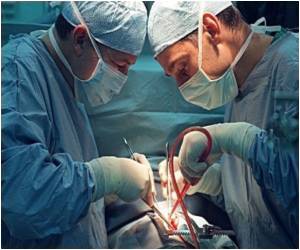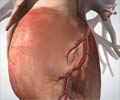In patients, the incidence of chronic pain following cardiac surgery can be reduced when the drug pregabalin is used before surgery and for 14 days post-surgery.

"Heart disease can be painful and disabling; however, heart surgery to treat the disease often leaves patients with a new persistent pain around the incision site, which can be equally disabling and burdensome," said Sibtain Anwar, M.B., M.A., F.R.C.A., research fellow at Barts and the London School of Medicine and Dentistry, England. "In the study we discovered a way to identify patients at risk for developing persistent postsurgical pain, as well as to prevent it with a regimen of pregabalin."
In this double-blind, randomized and controlled study, 150 patients scheduled for elective cardiac surgery were divided into three groups. The first group received pregabalin preoperatively and for 14 days following surgery. The second group received the same regimen of pregabalin as the first group, plus an infusion of ketamine for 48 hours after surgery. The third group received an entirely placebo-based regimen. All other surgical and anesthetic care was unchanged and included patient controlled morphine following surgery.
Before and after surgery, quantitative sensory testing of the patients' nervous systems was performed. This was based on the idea that the nervous system response to the experimental pain in the laboratory may give insight into how it will respond to subsequent surgical pain. One technique involved inducing pain by applying measured pressure at four points on the chest, followed by a second "distracting" pain in the arm with the use of a very tight blood pressure cuff. Measuring a person's change in pain sensitivity before and after the distracting arm pain, as well as before and after surgery, predicted whether they would develop pain that persisted many months later, the study found.
The study also found that using pregabalin reduced the incidence of persistent postsurgical pain in 10 percent and 8 percent of the patients at three and six months, respectively. The incidence of pain in the placebo group was 50 percent at three months and 46 percent at six months. The addition of ketamine for the second group did not significantly affect pain after surgery, the study found.
This study demonstrated that an individual's psychology is also important. "Interestingly, a patient's anxiety and worry about the procedure in the days leading up to the surgery had a direct and independent effect on his or her acute and persistent postsurgical pain. Positive thoughts and attitude about pain in general improved long-term pain outcomes," explained Dr. Anwar. This observation has the potential to help doctors identify vulnerable individuals prior to surgery and to allow informed consent and discussion regarding risk of chronic pain.
The American Society of Anesthesiologists
Founded in 1905, the American Society of Anesthesiologists (ASA) is an educational, research and scientific society with more than 50,000 members organized to raise and maintain the standards of the medical practice of anesthesiology. ASA is committed to ensuring physician anesthesiologists evaluate and supervise the medical care of patients before, during and after surgery to provide the highest quality and safest care every patient deserves.
 MEDINDIA
MEDINDIA




 Email
Email










